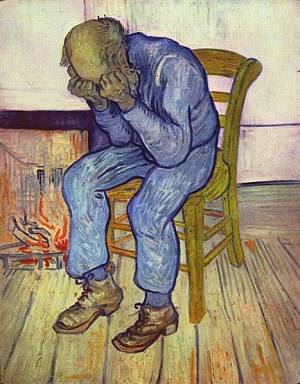मीनोपोज या प्री मीनोपोज के बारे मे जानकारी का अभाव महिलाओं को और ज्यादा तनाव ग्रस्त कर देता है. पर ये जानना बहुत जरुरी है कि बीमारी नही है मीनोपोज पर क्या है मीनोपोज बेशक, ये भी एक कठिन दौर होता है जब बेहद रक्तस्राव होने से कमजोरी आ जाती है और बहुत लक्षण महिलाए को तनाव मे डाल देते हैं.
कल एक पार्टी में मेरी पुरानी सहेली मिली. मिली क्या असल में मैने ही उसे ढूढा. एक किनारे पर चुपचाप बैठी थी. मुझे भी उसने सूखा सा हैलो बोला. यहां वहां की बात करने के बाद जब मैने उससे उसका हाल चाल पूछा तो उसने बताया कि कुछ समय से पता नही उसे क्या होता जा रहा है . कुछ करने का मन नही करता एक अजीब तरह की बेचैनी सी महसूस होती है. उसे न भूख लगती न ही कहीं जाने की इच्छा होती है कई बार आधी रात को पसीने से तर हो जाती हूं और नींद खुल जाती है कई बार सारी सारी रात नींद ही नही आती तो कई बार दिन मे बहुत नींद आती है. कई बार दस दस दिन रक्तस्राव होता है तो कई बार तीन तीन महीने हो जाते हैं रक्तस्राव ही नही होता. मैने इस बात को जरा भी गम्भीरता से नही लिया. उसे बताया कि यह भी एक तरह का चक्र है जिसमे हम महिलाओं को धर्य और संयम के साथ दो चार होना पडता है अब इसे सहर्ष स्वीकार कर लें या तनाव बना कर रखें ये अपने हाथ मे है. उसने बताया कि डाक्टर भी उसे यही कह रही थी. अल्ट्रा सांऊड भी करवाया है वो भी ठीक है …
मैने जो नेट पर पढा था या जो अपने अनुभव थे उसे बताए कि उसे अपना ख्याल कैसे रखना चाहिए
Women in Menopause Need Foods With These Minerals and Vitamins

Plenty of things change as women approach menopause. Fortunately, some undesirable consequences like bone loss and hot flashes may be reduced with a few diet changes.
Menopause is a difficult time for many women. It can be a little reassuring to know that the foods you put on your shopping list can make a difference, and can help restore some sense of normalcy to your life. Read more…
मीनोपोज में सबसे ज्यादा जरुरी है कि खुद को व्यस्त रखें.. खुश रखे अपना ध्यान अच्छी बातों में लगाए और सबसे ज्यादा जरुरी खान पान पर ध्यान देना है आयरन और कैल्शियम का सही सेवन बहुत जरुरी है क्योकि कई बाद बहुत ब्लीडिंग होने से शरीर में कमजोरी आ जाती है सही मायनों में क्या है मीनोपोज प्रश्न आपको तंग नही करेगा और वैसे भी जिंदगी को pause नही करता मीनोपोज …
महिलाओ की छोटी छोटी समस्याओं के बारे में गायनाकोलोजिस्ट रचना सांगवान से लिया मेरा एक इंटरव्यू एक वीडियों
The post क्या है मीनोपोज appeared first on Monica Gupta.
By David Murphy
Clinical psychologists help a huge range of people, of all ages, with an increasing number of mental health problems. Here are my top tips for getting into clinical psychology training.
(1) Firstly, and probably most importantly, when you are at University, do your best consistently in your Psychology degree. Relevant experience can always be gained later down the line, but you only have a limited time to work on your degree and then your marks stay with you. Your degree transcript containing your marks from every module is used in selection.
(2) Once your degree is in the bag then you need to get relevant experience. Not just to put on your application form but to make sure that working in this field is really what you want to do. Getting a paid assistant psychologist posts is very competitive; in fact nowadays it is actually more competitive than getting onto a doctoral training course. If you can’t get a traditional assistant psychologist post, there is a wide range of other types of relevant clinical experience; nursing assistant posts and/or some voluntary work are also a useful first step on the ladder.

(3) When you do come to filling in your application form, try and communicate something about yourself, what you have learned, and what skills you have developed through your clinical experience and also in your other activities. Think of ways to set yourself apart from other applicants.
(4) Choose your referees wisely and support them. It’s true that you can’t write the references but you can choose who you ask and help your referee by providing them with information about what the courses are looking for, particularly if they are not used to writing forms for clinical psychology. It’s such a shame when you see a great form accompanied by a clinical reference from someone who has only recently met the applicant or who can’t really comment on their clinical work, or an academic reference from someone who appears to have forgotten all about the applicant. If this information is lacking then it makes it very difficult for a course to know whether or not you meet the selection criteria.
(5) Reflect and review. I’ve heard a lot of people say they were told not to even think about applying for Clinical Psychology training because of how competitive it is. Nevertheless, each year several hundred applicants do get places, so it is certainly possible. You may well not get a place on your first attempt but don’t let that put you off. However, you also need to be realistic and reflect on your progress. It’s true that you generally need to have 1-2 years of relevant experience to maximize your chances but if, after a number of attempts you find you still haven’t been successful, it is probably time to rethink. There are plenty of other ways in which you can apply your psychology degree within healthcare and also within many other fields.
Whatever way it turns out I wish you all the best!
David Murphy is the Joint Course Director of the University of Oxford Clinical Psychology Doctoral Training Programme, and co-editor of What is Clinical Psychology? He trained as a clinical psychologist at the Institute of Psychiatry in London and worked for over 20 years as a full-time clinical psychologist in acute hospital settings within the National Health Service before taking up his current position.
Subscribe to the OUPblog via email or RSS.
Subscribe to only psychology articles on the OUPblog via email or RSS.
Image credit: Image via iStockphoto.
The post Five tips for getting into clinical psychology training appeared first on OUPblog.

With the British Psychological Society Annual Conference underway, we checked in with Susan Llewelyn, Professor of Clinical Psychology at the University of Oxford, and David Murphy, Joint Course Director for Oxford Doctoral Course in Clinical Psychology. We spoke to the co-editors of What is Clinical Psychology? about psychosis, provision of care, and careers in clinical psychology.
When did you first become interested in clinical psychology?
Sue: When I was an undergraduate studying psychology, I realised clinical psychology was by far the most interesting aspect of psychology. I was particularly interested in psychosis and what “madness” was.
David: Although I covered aspects of mental health in my undergraduate degree, I don’t think I really decided to pursue clinical psychology as a career option until I began working as an assistant psychologist and saw the range of different roles for clinical psychologists in the NHS. I worked for a while in a residential centre for people with epilepsy and became fascinated with the relationship between the brain and behaviour.
What do you think has been the most important development in clinical psychology in the past 100 years?
Sue: Probably the articulation of the cognitive, or information processing model of human behaviour and emotion, to balance the biological or the psychodynamic.
David: Clinical psychology is still such a young discipline that almost all the developments were within the last 100 years and most within the last 50 years. I think the pioneering work in behaviour therapy by Vic Meyer and others, helped open up the notion that psychological therapy could be effective in severe and intractable psychiatric problems like OCD and really changed the role of the clinical psychologist.

What is the most pressing or controversial issue in clinical psychology right now?
Sue: How we can deliver high quality clinical psychology services to meet all the so far unmet need.
David: I agree with Sue, we know from epidemiological surveys that there are large numbers of people with mental health problems who don’t or cant access services. We need to be better at using the resources to provide the most effective and responsive services we can; this often means trying to intervene early.
How might your current research have an impact on the wider world?
Sue: I am not sure I can be that grandiose! But our work tries to show how psychologically grounded ideas can make a big difference in people’s lives, and how taking the psychological realm seriously can improve the nature of the health care that can be offered to people in distress.
David: I agree with Sue; hopefully reading about the applications of psychology in practice across a diverse range of settings might inspire the next generation of clinical psychologists to pursue what is quite a long and challenging path into the profession.
Which famous psychologist has been most influential to you?
Sue: My friend and colleague Professor Glenys Parry in Sheffield has helped me to understand two important areas of psychological functioning: first how broad social and political influences shape the psychological (particularly how social and political gender issues become internalised and intimately lived by individuals), and second, how both the insights of psychodynamic, interpersonal therapies and CBT therapies can be effective combined to maximise how much we can help people.
David: That’s a really tough one! I’ve been lucky enough to work with a number of really inspirational psychologists through my career to date and, of course, many psychologists I haven’t met have influenced me through their work. One person who stands out on a personal level to me is Padmal De Silva who was my clinical tutor during training in London. Padmal was an internationally renowned expert in an array of areas; obsessive compulsive disorder, sexual and marital therapy, post-traumatic stress and Buddhist psychology. One of the most intelligent people I have ever met, he was also one of the most kind and humble. He always seemed to have time for people, even us trainees, and was genuinely interested in what they had to say. I feel very privileged that now in Oxford I have responsibility for training the clinical psychologists of the future and I am fortunate to have Padmal and others as role-models to aspire to.
What advice would you give to someone wanting to specialize in your field?
Sue: Try to be open minded about ideas: you can gain insights about the human condition from so many places including the newspapers, politics, art and literature, and conversations with friends, as well as psychology textbooks.
David: Read my OUPblog post “Five top tips to getting into Clinical Psychology” tomorrow!
What do you see as being the future of research in your field in the next decade?
Sue: We may be able to track more carefully what are the important components of our interventions, so that we can tailor what we offer more precisely to our clients
David: Wow, there are no easy questions, are there! I think research in psychological therapies, at least, will need to be not only carried out with larger sample sizes with longer follow ups but also with very detailed analysis of individual factors and therapy process factors to really enable us to answer the question “what works for whom”.
If you weren’t teaching clinical psychology, what would you be doing?
Sue: Reading really beautifully written literature, and also walking with friends and family in the mountains
David: Learning about clinical psychology! I’ve always found teaching to be just a natural extension of learning and practicing, if I can pass on what I’ve learned to trainees then hopefully I will hopefully have contributed in some way to them going out and generating more knowledge and innovative practice. I do have a life outside Psychology though, and in that life I enjoy playing football (even though I’m still not very good at it) and travelling to new places with my family.
Susan Llewelyn is Professor of Clinical Psychology at Oxford University, and Senior Research Fellow, Harris Manchester College, Oxford. David Murphy is the Joint Course Director of the University of Oxford Clinical Psychology Doctoral Training Programme. They are co-editors of the new edition of What is Clinical Psychology?
Subscribe to the OUPblog via email or RSS.
Subscribe to only psychology articles on the OUPblog via email or RSS.
Image credit: Teenage Girl Visits Female Doctor’s Office Suffering With Depression. © monkeybusinessimages via iStockphoto.
The post Q&A with Susan Llewelyn and David Murphy appeared first on OUPblog.

By Lloyd A. Wells
It is easy to delineate what clinical decision-making is not. It is not evidence-based medicine; it is not critical thinking; it is not eminence-based medicine; it is not one of many other of its many attributes; and it stands alone, with many contributions from all these fields. It is far more difficult to characterize what clinical reasoning is and very difficult to define.
But the clinicians among us deal with it every day and, I think, recognize it when we do it and observe it.
Evidence-based medicine is a mantra. But it is a difficult mantra. No one wants to say, “I reject evidence: I am a quack.” But it is complex and difficult. Evidence from the research in psychiatry comes from clinical trials, neural imaging, genetics, and other fields. Clinical trials can be read and understood. They are viewed as the sine qua non of evidence-based medicine. But the trials are conducted on patients without any other clinical conditions and are usually of very brief duration. The clinician, on the other hand, is often dealing with patients with many other syndromes and a great deal of chronicity. It is hard to make a claim, based on evidence, that the excellent clinical trial of Drug X applies to such a patient.
Neural imaging is far more difficult. It is a very complex methodology, and psychiatric studies which use it include as investigators physicists, neuroradiologists, psychiatrists, psychologists, and others. The work is so interdisciplinary that, usually, none of the authors understands the entire paper. This is a huge question, I believe, for philosophy of science. Most of these studies are conducted on a small N, with very complex statistics, and few have been replicated. What is the clinician to do with them? Many clinicians make the assumption that the spectroscopic findings somehow translate to clinical “facts”, but that is generally not a safe assumption, nor one on which to base treatment decisions as yet.
Similarly, genetics studies are also very difficult, especially because of the completely central statistical analyses which are necessary to understanding the papers — and which few clinicians have time to read or sufficient training to understand.

Many clinicians try hard to be “evidence-based”, but it is very difficult for anyone to truly sort through the evidence in order to make an on-the-spot clinical decision which will affect the health of a patient. Some journals and digests attempt to do this in order to assist clinicians, but reliance on them implies a trust in their employees which may or may not be justified.
For all these reasons, “eminence-based” reasoning has some attraction. The clinician should base his decisions on recommendations of experts rather than her or his own scrutiny of the literature. But many of the experts are quite old and have been removed from day-to-day clinical interactions for many years.
A couple of years ago I encountered a young patient with a severe, atypical depression. My immediate response was, “This patient reminds me of another patient, who had a superb response to a monoamine oxidase inhibitor, so perhaps I should try one.” This is a poor rationale for a clinical decision until it is parsed, but, in fact, the young man’s depression was categorically similar to that of the other patient, neither had responded to more traditional treatment, and there was a supportive literature for the use of a monoamine oxidase inhibitor in this type of clinical situation. The patient in fact responded well to this treatment. I believe that this type of clinical decision-making is common and that it is based on science and evidence, though sometimes the science and evidence are not immediately apparent unless the clinician thinks about it.

Clinical reasoning requires consideration of the evidence and efforts to assess it, good critical thinking, and also, in my view, the experience of interacting with and treating many patients over time. It is not a laboratory exercise but one which involves a doctor, a patient, and the world around them.
Lloyd A. Wells, Ph.D., M.D., is Consultant Emeritus at the Mayo Clinic in Rochester, Minnesota, USA. While there, he chaired the Division of Child and Adolescent Psychiatry for nineteen years and was the Department of Psychiatry’s Education Chair for twelve years. He is co-editor, with Christian Perring, of Diagnostic Dilemmas in Child and Adolescent Psychiatry.
Subscribe to the OUPblog via email or RSS.
Subscribe to only brain sciences articles on the OUPblog via email or RSS.
Image credits: (1) Wooden Sculpture of Science Genetics, by epSos.de, CC-BY-2.0 via Wikimedia Commons. (2) Sorrowing Old Man, by Vincent van Gogh, public domain via Wikimedia Commons.
The post What is clinical reasoning? appeared first on OUPblog.








